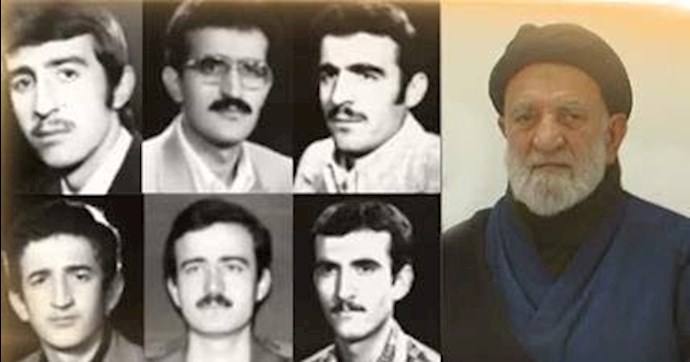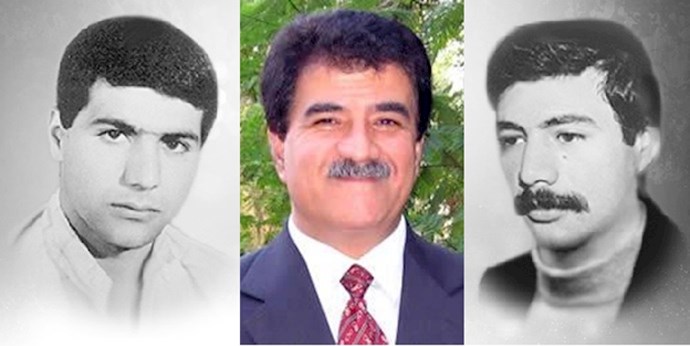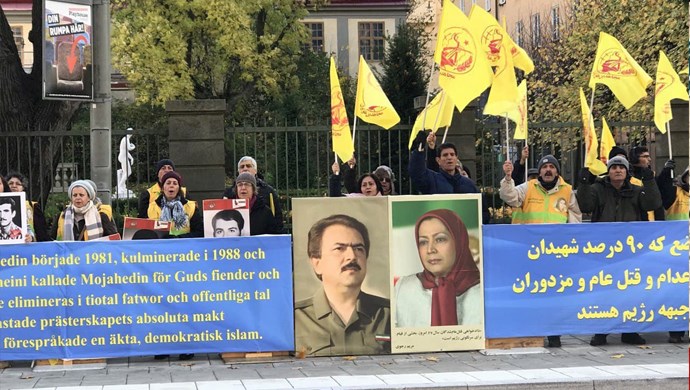Reporting by PMOI/MEK
Sweden, October 13, 2021—Tuesday marked the twenty-seventh session of the trial of Hamid Noury, an Iranian prison official charged with torturing inmates in the Gohardasht prison (Karaj) and taking part in the 1988 massacre of thousands of political prisoners. Noury was apprehended by Swedish authorities during a trip to the country. Noury is now standing trial in a court in Stockholm, where many of his victims are giving harrowing testimonies of how he and other regime officials brutally tortured prisoners.
During Tuesday’s session Ms. Khadijeh Borhani, the lone survivor of a family of Iranian dissidents killed by the Iranian regime, testified through video conference from Albania.
Ms. Borhani is the daughter of Abolghassem Borhani, a famous cleric and a former Friday prayer leader in the city of Qazvin. The Iranian regime killed six of Ms. Borhani’s siblings because they supported the People’s Mojahedin Organization of Iran (PMOI/MEK). Two of her brothers were among the victims of the 1988 massacre.
During the summer of 1988, the Iranian regime carried out the swift and brutal execution of more than 30,000 political prisoners, mostly MEK members and supporters. The purge was directly ordered by regime supreme leaders Ruhollah Khomeini in an edict that explicitly stated that anyone supporting the MEK is an enemy of God and deserves to be executed.
Seyyed Mohammad Hossein Borhani was arrested in 1981 when he was only 17 years old. He was sentenced to life in prison for supporting the MEK. In April, Hossein and Ahmad, another of her brothers, who were in Qazvin’s Chubin prison were transferred to Gohardasht prison and hanged during the mass executions.
“When my mother went to the prison, they handed her Hossein’s wristwatch,” she said. “There were no items from Ahmad.”
Prison authorities did not tell the Borhani family when their sons were executed. Neither did they deliver the bodies or tell the family where their loved ones were buried.
Ms. Borhani also spent time in prison.
“I was twelve years old when I was arrested,” Ms. Borhani said. “My father was a famous cleric of the Jameh Mosque, one of two great mosques in Qazvin. My mother was also arrested and tortured. The prison guards broke her legs with thick metal bars. Both my parents died of heart attack resulting from the pressure imposed by the regime.”
“I’m proud of my brothers and my parents,” Ms. Borhani said. “Losing them is very hard for me, but I have pledged to follow their example and continue their path.”

The Borhani family, all killed by the Iranian regime
Also testifying in court was Seyyed Hossein Seyyed Ahmadi, who also joined the session through video conference from Albania. Mohammad and Mohsen, two of Mr. Seyyed Ahmadi’s brothers, were executed during the 1988 massacre. Ali, a third brother was murdered by the Iranian regime’s terrorist proxy forces in Iraq in 2013.
Mohsen was arrested in 1980 for supporting MEK.
“In 1980, I went to prison along with my mother to visit my brother Mohsen,” Mr. Seyyed Ahmadi said. “He told us that he had been tortured and asked that we meet in person. When they brought him, I noticed that he can’t walk right because he had been brutally tortured and was walking on the sides of his feet.”
Mr. Seyyed Ahmadi explained that in 1980, when his brother was arrested, the regime had still not banned the activities of the MEK. “[Mohsen] was sentenced to one year in prison, but the regime never released him because he refused to denounce the MEK,” he said.
Mohsen was one of nearly 100 MEK supporters who became known as the “1980 prisoners.” They were all given minor sentences but were eventually executed.
During one of her visits to prison Mr. Seyyed Ahmadi’s mother objected to the regime’s treatment of her son. The prison guards attacked her and beat her, breaking her arm.
“A few months after the executions, the authorities called my mother and told her to go to the prison,” Mr. Seyyed Ahmadi said. “At first she thought that she would visit her son or would hear about Mohsen. But when she got there, they handed her two bags and said that one of them belongs to Mohsen and the other to Mohammad. They told her, ‘We executed your sons. There’s no need to come to prison to see them anymore.’”

Left to right: Mohsen, Ali, and Mohammad Seyyed Ahmadi, MEK members executed and murdered by the Iranian regime
While the court proceeded, a large group of Iranians resumed their protest rally in front of the court, calling for the prosecution of senior regime officials, including Raisi and supreme leader Ali Khamenei. Many of the protesters were family members of the thousands of dissidents murdered or executed by the regime.
The 1988 massacre has been described as a war crime and crime against humanity. Legal experts also recognize it as a “genocide” and should be addressed by international tribunals.





